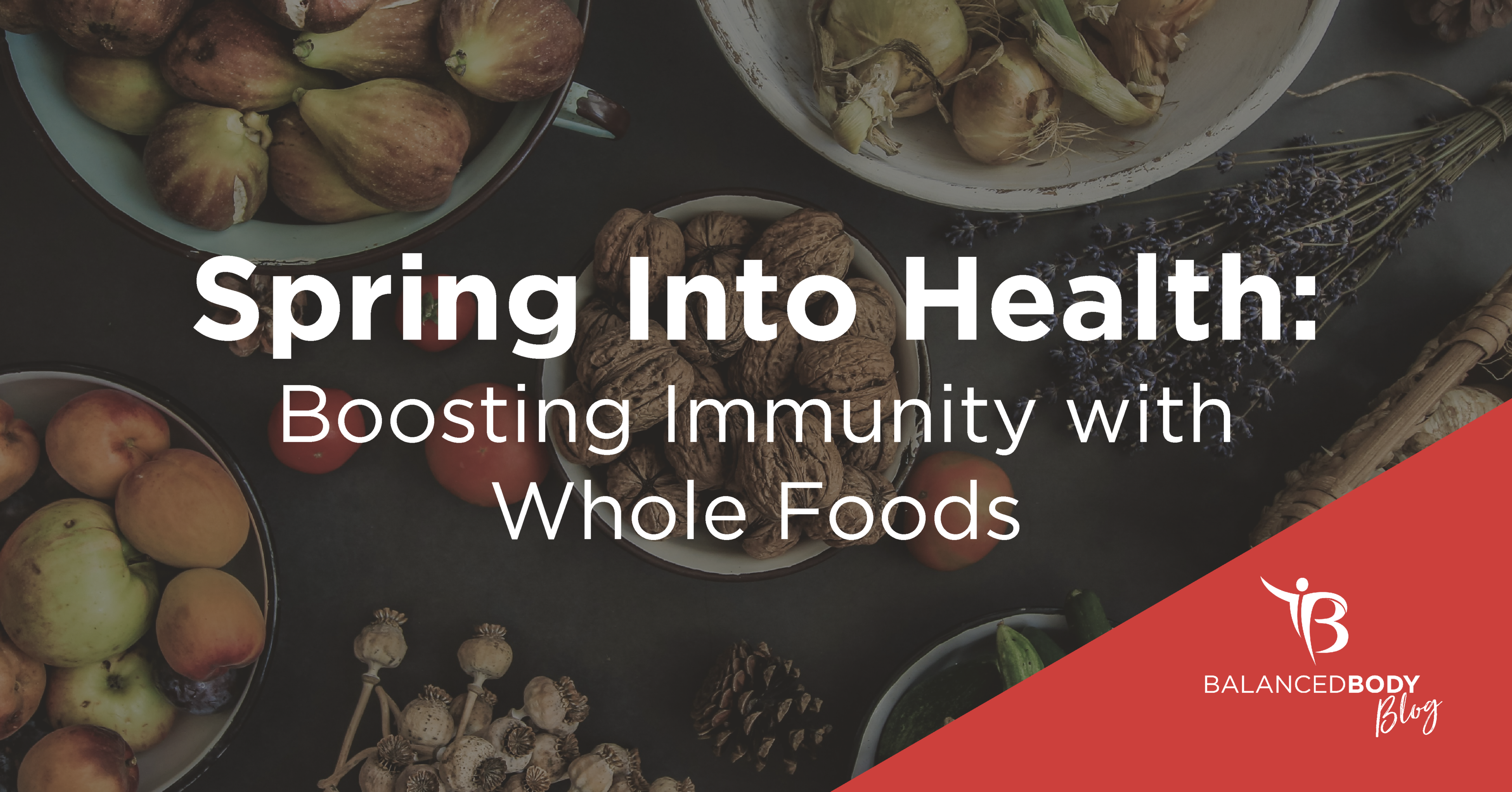As the winter fades away and spring creeps upon us, it’s essential to nurture our bodies and fortify our
immune systems for the changing seasons ahead.
The start of Spring is exciting, but it can also bring its own set of health challenges, such as seasonal
allergies and increased susceptibility to colds and viruses.
One powerful way to support our health during this transition is through the consumption of whole foods.
Whole foods are those that are minimally processed and close to their natural state, rich in essential
nutrients, antioxidants, and phytochemicals that support overall health and bolster the immune system.
Let’s explore some of the key whole foods that can help us thrive during the springtime:
● Citrus Fruits: Oranges, grapefruits, lemons, and limes are bursting with vitamin C, a potent
antioxidant that supports immune function by enhancing the production of white blood cells, which
help fight off infections. Including citrus fruits in your diet can provide a refreshing and
immune-boosting addition to your spring meals and snacks.
● Dark Leafy Greens: Greens such as spinach, kale, and Swiss chard are nutritional
powerhouses, packed with vitamins, minerals, and antioxidants. They are particularly rich in
vitamins A, C, and K, as well as folate and iron, all of which play vital roles in supporting immune
health and overall well-being.
● Berries: Strawberries, blueberries, raspberries, and blackberries are not only delicious but also
loaded with antioxidants, including flavonoids and anthocyanins, which have anti-inflammatory
and immune-boosting properties. Adding a handful of berries to your breakfast or enjoying them
as a snack can provide a flavorful way to help protect your body against seasonal illnesses.
● Garlic and Onions: Rich in compounds that have been shown to support immune function and
combat microbial infections. Incorporating garlic and onions into your meals can help ward off
springtime sniffles and keep your immune system strong.
● Yogurt and Fermented Foods: Probiotics, found in yogurt, kefir, sauerkraut, and other
fermented foods, promote the growth of beneficial bacteria in the gut, which plays a crucial role in
supporting immune function. Including probiotic-rich foods in your diet can help maintain a healthy
balance of gut microbiota and strengthen your body’s defenses against pathogens.
● Nuts and Seeds: Almonds, walnuts, sunflower seeds, and pumpkin seeds are excellent sources
of vitamins, minerals, and healthy fats that support immune health. Best to eat their raw form.
They also provide a convenient and satisfying snack option for busy spring days spent outdoors.
● Herbs and Spices: Incorporating herbs and spices such as turmeric, ginger, oregano, and
cinnamon into your cooking not only adds flavor but also provides immune-boosting benefits.
These culinary staples are rich in antioxidants and anti-inflammatory compounds that can help
protect against seasonal illnesses and promote overall health.
By incorporating certain in season foods we experience many positive effects on our bodies some which
include:
● Antioxidant Power: Many foods, particularly colorful fruits and vegetables, are rich in
antioxidants such as vitamins A, C, and E, as well as phytonutrients like flavonoids and
carotenoids. Antioxidants help neutralize harmful free radicals in the body, reducing oxidative
stress and inflammation, which can weaken the immune system.
● Gut Health: A healthy gut is key to a strong immune system. Probiotic-rich foods like yogurt, kefir,
sauerkraut, and kimchi contain beneficial bacteria that support gut health and immune function.
Fiber-rich foods like fruits, vegetables, and whole grains also feed the good bacteria in our gut,
promoting a thriving microbial ecosystem.
● Anti-inflammatory Properties: Chronic inflammation can compromise immune function and
contribute to various health problems. Foods with anti-inflammatory properties, such as fatty fish
(rich in omega-3 fatty acids), nuts, seeds, olive oil, and spices like turmeric and ginger, help
reduce inflammation and support immune health.
● Hydration: Staying hydrated is essential for overall health, including immune function. Water
helps flush toxins from the body, supports the production of lymphatic fluid (which carries immune
cells), and keeps mucous membranes moist, helping to trap and expel pathogens.
● Balanced Diet: A balanced diet that includes a variety of nutrient-dense foods ensures that your
body gets all the essential nutrients it needs to support a robust immune system. Aim for a
colorful plate filled with a diverse array of fruits, vegetables, whole grains, lean proteins, and
healthy fats.
● Mindful Eating: In addition to what we eat, how we eat also matters. Mindful eating practices,
such as paying attention to hunger and fullness cues, savoring each bite, and eating slowly, can
help reduce stress and improve digestion, both of which contribute to overall immune health.
It’s important to keep in mind that while incorporating these whole foods into your diet, it’s essential to
stay hydrated by drinking plenty of water and herbal teas, engage in regular physical activity, get
adequate sleep, and manage stress levels – all of which are essential components of a healthy lifestyle
that supports immune function.
While no single food can magically prevent illness, incorporating immune-boosting foods into your diet
can provide your body with the nutrients and support it needs to stay strong and resilient. By nourishing
your body with wholesome, nutrient-dense foods, you can help bolster your immune system and optimize
your health from the inside out
By making mindful choices and prioritizing our health, we can enjoy all that spring has to offer while
staying strong and resilient in the face of whatever challenges may come our way.
